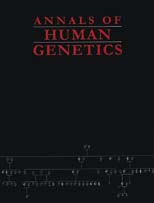Crossref Citations
This article has been cited by the following publications. This list is generated based on data provided by
Crossref.
Simpson, Joe Leigh
and
Rajkovic, Aleksandar
1999.
Ovarian differentiation and gonadal failure.
American Journal of Medical Genetics,
Vol. 89,
Issue. 4,
p.
186.
Mills, W.
Critcher, R.
Lee, C.
and
Farr, C. J.
1999.
Generation of an 2.4 Mb Human X Centromere-Based Minichromosome by Targeted Telomere-Associated Chromosome Fragmentation in DT40.
Human Molecular Genetics,
Vol. 8,
Issue. 5,
p.
751.
Shaffer, Lisa G.
and
Lupski, James R.
2000.
MOLECULAR MECHANISMS FOR CONSTITUTIONAL CHROMOSOMAL REARRANGEMENTS IN HUMANS.
Annual Review of Genetics,
Vol. 34,
Issue. 1,
p.
297.
SIMPSON, JOE LEIGH
2000.
Menopause.
p.
77.
SIMPSON, JOE LEIGH
and
RAJKOVIC, ALEKSANDAR
2004.
The Ovary.
p.
541.
Adeyinka, Adewale
Smoley, Stephanie
Fink, Stephanie
Sanchez, Jessica
Van Dyke, Daniel L.
and
Dewald, Gordon
2007.
Isochromosome (X)(p10) in hematologic disorders: FISH study of 14 new cases show three types of centromere signal patterns.
Cancer Genetics and Cytogenetics,
Vol. 179,
Issue. 1,
p.
25.
SIMPSON, JOE LEIGH
2007.
Treatment of the Postmenopausal Woman.
p.
29.
Sagi, Liora
Zuckerman-Levin, Nehama
Gawlik, Aneta
Ghizzoni, Lucia
Buyukgebiz, Atilla
Rakover, Yardena
Bistritzer, Tzvi
Admoni, Osnat
Vottero, Alessandra
Baruch, Oshrat
Fares, Fuad
Malecka-Tendera, Ewa
and
Hochberg, Ze’ev
2007.
Clinical Significance of the Parental Origin of the X Chromosome in Turner Syndrome.
The Journal of Clinical Endocrinology & Metabolism,
Vol. 92,
Issue. 3,
p.
846.
Höckner, Martina
Pinggera, Germar-Michael
Günther, Barbara
Sergi, Consolato
Fauth, Christine
Erdel, Martin
and
Kotzot, Dieter
2008.
Unravelling the parental origin and mechanism of formation of the 47,XY,i(X)(q10) Klinefelter karyotype variant.
Fertility and Sterility,
Vol. 90,
Issue. 5,
p.
2009.e13.
Binkert, Franz
Spreiz, Ana
Höckner, Martina
Miny, Peter
von Dach Leu, Brigitte
Erdel, Martin
Zschocke, Johannes
Utermann, Gerd
and
Kotzot, Dieter
2010.
Parental origin and mechanism of formation of a 46,X,der(X)(pter→q21.1::p11.4→pter)/45,X karyotype in a woman with mild Turner syndrome.
Fertility and Sterility,
Vol. 94,
Issue. 1,
p.
350.e12.
Ou, Zhanhui
Li, Shaoying
Li, Qing
Chen, Xiaolin
Liu, Weiqiang
and
Sun, Xiaofang
2010.
Duchenne Muscular Dystrophy in a Female Patient with a Karyotype of 46,X,i(X)(q10).
The Tohoku Journal of Experimental Medicine,
Vol. 222,
Issue. 2,
p.
149.
Scott, S. A.
Cohen, N.
Brandt, T.
Warburton, P. E.
and
Edelmann, L.
2010.
Large inverted repeats within Xp11.2 are present at the breakpoints of isodicentric X chromosomes in Turner syndrome.
Human Molecular Genetics,
Vol. 19,
Issue. 17,
p.
3383.
Cetin, Z
Mendilcioglu, I
Yakut, S
Berker-Karauzum, S
Karaman, B
and
Luleci, G
2011.
Turner Syndrome with Isochromosome Xq and Familial Reciprocal Translocation t(4;16)(p15.2;p13.1).
Balkan Journal of Medical Genetics,
Vol. 14,
Issue. 1,
Koumbaris, George
Hatzisevastou-Loukidou, Hariklia
Alexandrou, Angelos
Ioannides, Marios
Christodoulou, Christodoulos
Fitzgerald, Tomas
Rajan, Diana
Clayton, Stephen
Kitsiou-Tzeli, Sophia
Vermeesch, Joris R.
Skordis, Nicos
Antoniou, Pavlos
Kurg, Ants
Georgiou, Ioannis
Carter, Nigel P.
and
Patsalis, Philippos C.
2011.
FoSTeS, MMBIR and NAHR at the human proximal Xp region and the mechanisms of human Xq isochromosome formation.
Human Molecular Genetics,
Vol. 20,
Issue. 10,
p.
1925.
Yao, Ruen
Yu, Ding
Wang, Jian
Wang, Xiumin
and
Shen, Yiping
2018.
A rare unbalanced Y:autosome translocation in a Turner syndrome patient.
Journal of Pediatric Endocrinology and Metabolism,
Vol. 31,
Issue. 3,
p.
349.
Simpson, Joe Leigh
Qin, Yingying
and
Chen, Zi-Jiang
2019.
The Ovary.
p.
461.
Malhotra, Rakhi
Shukla, Rashmi
Kabra, Madhulika
Gupta, Yashdeep
Jyotsna, Viveka P.
and
Khadgawat, Rajesh
2020.
Impact of parental origin of X-chromosome on clinical and biochemical profile in Turner syndrome.
Journal of Pediatric Endocrinology and Metabolism,
Vol. 33,
Issue. 9,
p.
1155.
Tassanakijpanich, Nattaporn
Wright, Rachel
Tassone, Flora
Shankar, Suma P
and
Hagerman, Randi
2022.
Fragile X syndrome in a girl with variant Turner syndrome and an isodicentric X chromosome.
BMJ Case Reports,
Vol. 15,
Issue. 7,
p.
e247901.
Ibarra-Ramírez, Marisol
Campos-Acevedo, Luis Daniel
and
Martínez de Villarreal, Laura E.
2023.
Chromosomal Abnormalities of Interest in Turner Syndrome: An Update.
Journal of Pediatric Genetics,
Vol. 12,
Issue. 04,
p.
263.




